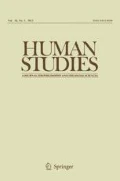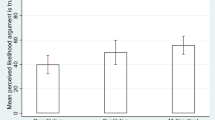Abstract
This essay provides evidence to support a promising conceptual and potentially practical set of ideas at once both principled and effective found in the work of Max Weber and Alfred Schutz addressed to the issue of ‘adequacy’ as a goal in social research. Efforts to achieve adequacy beyond the epistemological conditions required by Weber’s demand that evidence meet both causal adequacy and adequacy on the level of meaning were significantly refocused by Schutz’s later concern, responding specifically to Weber, that the social sciences also address themselves to his postulate of adequacy. It states that “Each term used in a scientific system referring to human action must be so constructed that a human act performed within the life-world by an individual actor in the way indicated by the typical construction would be reasonable and understandable for the actor himself, as well as for his fellow men”. A serious attempt to implement a more expansive notion of adequacy by practically activating this postulate in the ways suggested can be beneficial not only for the social research situation but in everyday life as well.
Similar content being viewed by others
References
Aron, R. (1964). German sociology. Free Press/Macmillan.
Bernays, M. (1911). Psycho-Physik der Textilarbeit. Archiv Fur Sozialwissenschaft Und Sozialpolitik, 32, 99–123.
Bernstein, R. (1976). The restructuring of social and political theory Philadelphia: University of Pennsylvania Press.
Brain, R. M. (2001). The ontology of the questionnaire: Max Weber on measurement and mass investigation. Studies in History and Philosophy of Science, Part A, 32(4), 647–684.
Cahnman, W. (1964). Max Weber and the methodological controversy. In W. Cahnman & A. Boskoff (Eds.), Sociology and History (pp. 103–127). Free Press.
Cannella, G., Perez, M., & Pasque, P. (Eds.). (2015). Critical qualitative inquiry: Foundations and futures. Routledge.
Denzin, N. and Y. Lincoln. (2011). The discipline and practice of qualitative research, in Handbook of qualitative research. Thousand Oaks, CA: Sage Publications, 1–19.
Denzin, N. and Y. Lincoln (editors.). (2000), 2005, 2011, 2018. Handbook of qualitative research. Various Editions. Thousand Oaks, CA: Sage Publications.
Durkheim, E. (1952). The division of labor in society. Translated with a preface by George Simpson. Macmillan.
Durkheim, E. (1992). Professional ethics and civic morals (2nd ed.). Routledge.
Eberle, T. (2010). The phenomenological life-world analysis and the methodology of the social sciences. Human Studies, 33, 123–139.
Gallacher, H. P. (1983). On the meaning of ‘Adequacy’ in the sociology of Alfred Schutz. Analecta Husserliana, 15, 91–97.
Garfinkel, H. (1967). The rational properties of scientific and commonsense activities, Studies in ethnomethodology. Englewood Cliffs, N.J. Prentice-Hall, 262–283.
Giddens, A. (1976). New rules of sociological method. Hutchinson.
Green, M. (1974). The Von Richtofen sisters. Basic Books.
Hennis, W. (2000). Max Weber’s science of man. Trans. K. Tribe. Newbury, UK: Threshold Press.
Lakatos, I., & Musgrave, A. (Eds.). (1965). Criticism and the growth of knowledge. Cambridge University Press.
Lazarsfeld, K., & Oberschall, A. (1965). Max Weber and empirical social research. American Sociological Review, 30(2), 185–199.
McLain, R. (1981). The postulate of adequacy: Phenomenological sociology and the paradox of science and sociality. Human Studies, 4, 105–130.
Markovic, M. (1983). The idea of critique in social theory, The Praxis International Archive. Central and Eastern European Library. Transcribed by Zdravko Saveski, 1–8.
Milgram, S. (1965). Some conditions of obedience and disobedience to authority. Human Relations, 18, 57–76.
Schutz, A. (1964). The problem of rationality in the social world. Collected papers II: Studies in social theory (pp. 64–88). Martinus Nijhoff.
Schutz, A. (1967a). The phenomenology of the social world. Evanston, Illinois: Northwestern University Press.
Schutz, A. (1967b). Collected papers I: The problem of social reality. The Hague: Martinus Nijhoff, 1967.
Weber, M. (1978). Economy and society I. Edited G. Roth and C. Wittich. Berkeley: University of California Press.
Weber, M. (1949). Methodology of the social sciences. Translated and Edited by E. Shils and H. Finch. Free Press.
Wilson, H. (1983). Anti-method as a counter-structure in social research practice. In: G. Morgan (Ed.), Beyond method: Strategies for social research (pp. 247–259). London: Sage Publications.
Wilson, H. (1985). How to make social science responsibly political. In Political management (pp. 143–163). Berlin: De Gruyter.
Wilson, H. (1988). Essential process of modernity: An analysis of social science research practices and an alternative. International University of Japan Annual Review, 5, 1–42.
Wilson, H. 2010. Bureaucratic competence as an essential factor in cross-cultural/multicultural program evaluations. Canadian Journal of Program Evaluation, 23(2), 93–115.
Zijderveld, A. (1972). The problem of adequacy: Reflections on Alfred Schutz’s contribution to the methodology of the social sciences. Archives of European Sociology, 13, 176–190.
Acknowledgements
‘In the cultural sciences, the knowledge of the universal or general is never valuable in itself.’ Max Weber, Methodology of the Social Sciences, 80.
Author information
Authors and Affiliations
Corresponding author
Additional information
Publisher's Note
Springer Nature remains neutral with regard to jurisdictional claims in published maps and institutional affiliations.
Rights and permissions
About this article
Cite this article
Wilson, H.T. ‘Adequacy’ as a Goal in Social Research Practice: Classical Formulations and Contemporary Issues. Hum Stud 44, 473–489 (2021). https://doi.org/10.1007/s10746-021-09602-6
Accepted:
Published:
Issue Date:
DOI: https://doi.org/10.1007/s10746-021-09602-6




